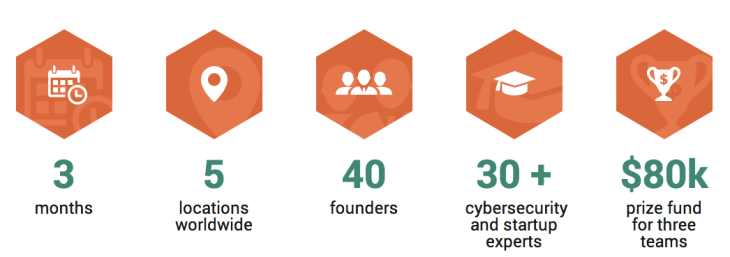More signs that security is rising up the investment agenda: another security-focused accelerator program has launched, hoping to put a clutch of security startups through their paces — this one with backing from veteran security firm Kaspersky Labs, via its educational arm Kaspersky Academy.
The Security Startup Challenge (SSC), as it’s being called (it’s part accelerator, part startup competition), also has Mangrove Capital Partners and Russian VC firm, the ABRT Fund, putting money behind it. It follows the launch last month of another not-for-profit cyber security accelerator in London, called CyLon — with counts Passion Capital’s Eileen Burbidge among its advisors.
VC firms are clearly eyeing up a fattening security pie. Kaspersky points to CB Insights data which tracked a 36 per cent increase in related financing last year, to a full year spend of $2.39BN, specifically covering Internet monitoring and security, mobile security and management, and data and network security. The analyst firm notes a further $141 million has been invested in those areas already this year.
Unlike CyLon, which has a West London home, the SSC accelerator program is not based at a single physical location. But like CyLon no equity is being taken in the participating startups (although SSC startups have to fund their own living costs for the program duration, but that seems fair given they can mostly stay at home).
The incentive here is for Kaspersky to get proximity to new business ideas, and the participating VC firms to improve their security-related deal flow — given they can always step in and invest in any of the early stage businesses that catch their eye.
“Technology megatrends such as mobile, cloud computing and the Internet of Things are leaving consumers increasingly, and unwittingly, exposed to cybercrooks. Perhaps more worrying is the fact that criminal syndicates operating on the Internet are as scalable as any other Internet-enabled business,” says Mangrove’s Michael Jackson, commenting on the launch in a statement. “We need to innovate our approach to cybersecurity to meet the demands of this new hyper-connected world.”
“It’s not a secret that the cyber threat landscape is constantly evolving. New threats appear every day… and the industry needs really new approaches, new ideas, new technologies. And I think these young, really intelligent and really talented guys can really contribute,” adds Kaspersky Lab’s Natasha Obelets, in an interview with TechCrunch.
“At the moment we do not have any plans to acquire any startups but of course if we see this idea can be really helpful or useful for our current developments, our current technologies we can surely collaborate with these guys. But no plans to acquire any startups at the moment,” she adds.
The SSC bootcamp/competition is open to startups based anywhere, and the three-month program is mostly remotely delivered. Although there will also be a series of (optional) preliminary two-day workshops in Jerusalem, Berlin, San Francisco, Singapore and Moscow, where startups hoping to join the program will have a chance to catch the eye of the selection committee. The program proper will also kick off with two bootcamps in Luxembourg, so there’s a bit of a European location bias.
The SSC lists the full schedule (including the optional components) as running from March to August. The actual accelerator program starts in May. The finale will be a pitch off type event at the Massachusetts Institute of Technology in the U.S. in August, where seven shortlisted teams will be competing for an $80,000 prize fund (put up by Kaspersky Labs). The price money will be split between three teams; with first prize being $50,000, $20,000 for second, and $10,000 for third.
Online registration — for both the workshops and main program — is open now and will run until April. The closing date for applications is April 28. Forty places are being made available to early stage startups, with a focus on young entrepreneurs (in the 18 to 35 year age-range), says Obelets. The selection committee includes Kasperskey’s global research and analysis team and its R&D team, along with business partners such as its VC backers.
What can the security startups which get selected expect? A blend of security-focused and business mentorship and advice (from “more than 30 experts”), mostly doled out online — so perhaps a little less serendipitously blended than startup bootcamp programs that sweat their teams in a shared co-working space. Think more pre-arranged Skype calls than random watercooler conversations. A partial list of mentors can be found on the SSC website.
As for areas of interest, Kaspersky is keeping things pretty broad-brush. “We’re really interested in such areas as Internet of Things… mobile… cloud… fintech or healthcare… We’re very flexible,” says Obelets. “The job of our experts — they know very well what is going on now for instance in the mobile area — and their job is to shape the ideas of the young startupers and make them really work and make them visible, and make them relevant. Maybe sanity checking… Checking these ideas against market trends, what is hot, what is most acute at the moment.”
This is the first startup-focused program the company has run but it’s hoping it won’t be its last. Indeed, it’s aiming to scale it up. Which figures, given the only certainty in the security space appears to be rising insecurity as more types of devices come online — where hackers can find them.
“We hope to run it on an annual basis,” she adds. “The first year we’re see how it works. And next year we will cover I think all geographies. Because now we cover the U.S., Europe, Asia, Russia, so we want to cover the whole world. We have ambitious plans!” she adds.
